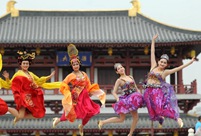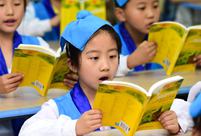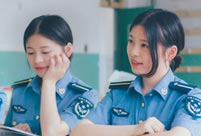

TOKYO, June 24 -- Yohachi Nakajima went to northeast China's Heilongjiang province in 1942 with his family as members of "the Japanese settlers group" when he was only a one-year-old baby, and he became "orphaned" after the militaristic Japan surrendered at the end of World War II in 1945.
Nakajima's family was tortured by freezing winters and food shortage in a small county in the province of then war-torn China. His father was missing and his younger sister died of malnutrition in the winter of 1945, while he himself was too weak to return to Japan with his mother and was left to a Chinese peddler, who walked along the street looking for good souls to harbor the dying Japanese boy.
Sun Zhenqin, a local Chinese female peasant, adopted Nakajima, a child from the former enemy. She massaged Nakajima's belly and fed him with chewed food. Emaciated Nakajima was recovering under her care and in the next 13 years, Sun raised the boy although she married three times.
About 3,000 Japanese children, nicknamed the Japanese war orphans, were left in China after WWII.
"My adoptive mother was like clean water without any impurities, " Nakajima told Xinhua in an interview. The tearful old man showed a letter Sun sent to his mother in Japan which read "I promise that I will send Nakajima back to Japan when he grows up."
Nakajima, 73, put the faded yellow letter in his autobiography "Why I Have My Life," which depicts his 13-year life of being a " Japanese-Chinese" in Ning'an county of Heilongjiang. "She was a poor Chinese woman who knew I was a child of the enemy but still brought me up. Such love is selfless and I will never forget her."
He even noted in his book that the local government adopted a policy to shelter Japanese war orphans. One of the 15 war orphans in the small village was mocked by a Chinese boy as "little Jap," Nakajima recalled, adding that then authorities issued a notification later requiring schools to protect the Japanese children from being bullied.
Nakajima hoped more and more Japanese people could understand Chinese people's enthusiasm and kindness through his book, which the amateur writer dedicated to his adoptive mother, three step fathers and the Chinese he met and worked with.
"I'm not a writer so that straightforward style of writing is what I have to tell my story based on own memories, but sometimes plain narration is more powerful than colorful words and has its unique power to move readers," Nakajima said.
His first reader was Nakamura, owner of a small book store Yogakudo close to Nakajima's home. The book vendor told Xinhua that Nakajima's book was the first one that he read twice and recalled the scenario when Nakajima brought the book to his store.
"I read the book the day when Nakajima gave it to me at one sitting. I was moved by the characters in the book and I called Nakajima in the morning next day, asking him to bring more copies to my store," Nakamura said. "What I'm selling is not a book, but grateful feelings toward the Chinese people."
Nakamura decided to help sell the obscure autobiography and he even printed homemade leaflets to popularize the book that was published at Nakajima's own expense. The book, however, surprisingly became a bestseller in the small store in months.
Many readers said in their letters sent to Nakajima that the book was different from Japanese media's reports on China and they totally changed their views on the neighboring country. "If there is one more reader, there will be one more Japanese who will truly understand Chinese people's heart," said Nakajima.
After graduation from a high school in Japan, Nakajima had a chance to have a well-paid job, but he joined a Japan-China friendship association which sometimes paid their wages late.
"I have to follow Mr. Liang's instruction to contribute to friendship between Japan and China," he said.
Liang was a colleague of Nakajima when he worked at a local forestry agency in Ning'an. Nakajima said that it was Liang who told him that he could help to develop Japan-China ties if he returned to Japan when the two countries were at odds due to then Japanese prime minister Nobusuke Kishi's conservative policies.
"My experiences in the Japan-China friendship group proved that political slogans are not enough. What really works are true stories. The characters in my books are real Chinese people and through them, Japanese people will understand Chinese people's real nature and then they will say no to so-called 'China threats', " said Nakajima, who ended up changing his given name to Shika, meaning "miss China" in Japanese.
Nakajima expressed his confusion and anxiety over the souring ties between Japan and China, describing the situation as running against what the two neighbors had anticipated when they normalized their ties in the 1970s. "This year marks the 70th anniversary of the end of World War II, and my book right now has its realistic significance," he said.
"I myself am a surviving victim of the war and to some extent I was also a perpetrator at the same time. Japanese people are kind- hearted, but they need to have their own opinion, or they may become followers of militarism," Nakajima said, referring to Prime Minister Shinzo Abe's attempts to ram the controversial security bills through parliament and deny Japan's wartime atrocities.
The second print of 1,000 copies of Nakajima's book was published and a renowned Chinese publisher will issue the Chinese- language version in China. Nakajima said he has fulfilled the task Liang assigned to him on boosting Japan-China friendship.
"Japan is my motherland, but China is my hometown," Nakajima concluded in fluent Chinese with a strong Heilongjiang accent.
 Students take graduation photos in ancient costumes
Students take graduation photos in ancient costumes Forbidden City collects evidence from nude photo shoot
Forbidden City collects evidence from nude photo shoot Dragon boat race held to celebrate upcoming Duanwu Festival
Dragon boat race held to celebrate upcoming Duanwu Festival  Chinese students learn Duanwu customs in Hefei, Anhui
Chinese students learn Duanwu customs in Hefei, Anhui Abandoned village swallowed by nature
Abandoned village swallowed by nature Graduation: the time to show beauty in strength
Graduation: the time to show beauty in strength School life of students in a military college
School life of students in a military college Top 16 Chinese cities with the best air quality in 2014
Top 16 Chinese cities with the best air quality in 2014 Mysterious “sky road” in Mount Dawagengzha
Mysterious “sky road” in Mount Dawagengzha Dialogue key to set future China-US course
Dialogue key to set future China-US course New PLA campaign targets new recruits: Land Force
New PLA campaign targets new recruits: Land Force Migrant workers encouraged to start own firms
Migrant workers encouraged to start own firms New route for Indian pilgrims hailed as sign of warming ties
New route for Indian pilgrims hailed as sign of warming tiesDay|Week